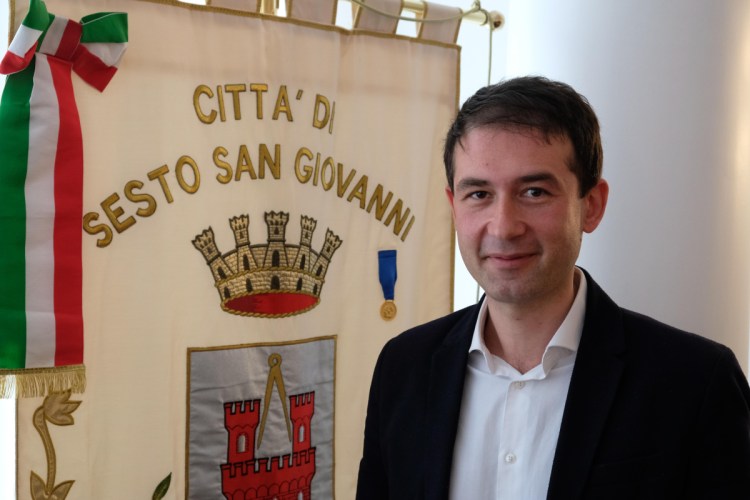SESTO SAN GIOVANNI, Italy — The leaders of this blue-collar town marked an anti-migrant milestone with a pistachio layer cake this week. To commemorate what they said was the 200th migrant expelled from their town, they wrote the number on top with green frosting.
As Italians vote in national elections Sunday, many of them share the migration-skeptic swagger of the right-wing leaders of Sesto San Giovanni. Italy is struggling to accommodate the more than 620,000 migrants who have arrived on its shores since 2013, and a new sentiment is gaining force: Boot them all out.
Ex-Prime Minister Silvio Berlusconi, whose center-right coalition appears to have the best shot at victory Sunday, has promised to defuse what he called a “social bomb ready to explode in Italy” by deporting 600,000 people. His coalition partners, including a group descended from the remnants of the Fascist Party, are even more vociferous toward the migrants, most of whom are from sub-Saharan Africa.
Italy’s choice Sunday could ripple throughout Europe because the country is the continent’s main migrant gateway.
Sesto San Giovanni has volunteered its crackdown on migrants as a blueprint.
“Sesto has become a model, a point of reference for the nation, that is showing you can rule and make changes against urban decay,” said Mayor Roberto Di Stefano, 40, a member of Berlusconi’s center-right Forward Italy party.
The town of 83,000, which abuts Milan, was once called the Stalingrad of Italy for its communist leanings. It had elected left-wing leaders since World War II, until the anti-immigrant campaigners swept into office this past summer.
The new leaders captured the sentiment of voters at a moment when unemployment remains stubbornly high and Italians are asking why they are spending money to support migrants when they themselves feel vulnerable.
“This city was at the mercy of crime,” Di Stefano said. Now, he said, “we are the first-place municipality in Italy when it comes to expulsions.”
After becoming mayor, he empowered police to press charges for minor quality-of-life violations, such as panhandling, and pressed them to be more aggressive in checking the papers of people they suspected of being in Italy illegally.
In a measure of the souring attitudes toward immigration, Berlusconi still counts as a moderate inside Italy even though his goals for mass deportations would require a level of coercion not seen in Western Europe since World War II. The sharpest objections have come from well outside the political mainstream.
“No country can ever catch, detain and expel 600,000 people,” said Riccardo Magi, the secretary general of the Italian Radicals, a left-wing party unlikely to clear the bar to enter parliament.
Refugees in Sesto San Giovanni say they have noticed the tougher climate in Italy. While he waited for a bus recently, Issa Diagouraga, 26, a refugee from Mali, said that national police in three squad cars stopped to watch him.
“They don’t stare at others the way they stare at me,” Diagouraga said. “It’s like they wanted me to feel the difference between being an Italian and a foreigner.”
Other refugees said they feared the outcome of the elections.
“They’re talking very badly about immigrants, and they say that if they win, a lot of things will change for us. They’re using immigrants to win more votes,” said Lamin Jarju, 19, a refugee from Gambia.
But they both said they hadn’t noticed any specific changes from the new approach by the mayor’s office, an account echoed by others who work with migrants and refugees in the area.
City leaders acknowledge their model would be difficult to implement on a national level because the migrants who they say have left Sesto San Giovanni have presumably simply gone next door to Milan, where officials are more welcoming.
“During a campaign, migration becomes an important flag to wave,” said Carlotta Serra, a coordinator and social worker at the Fight Against Marginalization Cooperative, a local organization that houses a reception center for refugees.
Milan officials say their citizens aren’t punishing them for accommodating migrants, even as they acknowledge some tensions.
“By welcoming migrants, you never get votes, but I believe that even if it hurts your popularity, you need to take responsibility and not back off,” said Pierfrancesco Majorino, the top official in the Milan city government charged with migration issues. “Let’s just say the city has understood that we’ve taken our responsibility.”
But across the border in Sesto San Giovanni, where steel mills have shuttered and the hum of manufacturing has given way to more precarious service industry jobs, many residents say they are cautious about the newcomers.
“I’m for welcoming those who are really fleeing war,” said Rafaele Mazza, 66, a retired railway worker. “But the whole of Africa doesn’t fit into Europe.”
Copy the Story LinkSend questions/comments to the editors.



Success. Please wait for the page to reload. If the page does not reload within 5 seconds, please refresh the page.
Enter your email and password to access comments.
Hi, to comment on stories you must . This profile is in addition to your subscription and website login.
Already have a commenting profile? .
Invalid username/password.
Please check your email to confirm and complete your registration.
Only subscribers are eligible to post comments. Please subscribe or login first for digital access. Here’s why.
Use the form below to reset your password. When you've submitted your account email, we will send an email with a reset code.